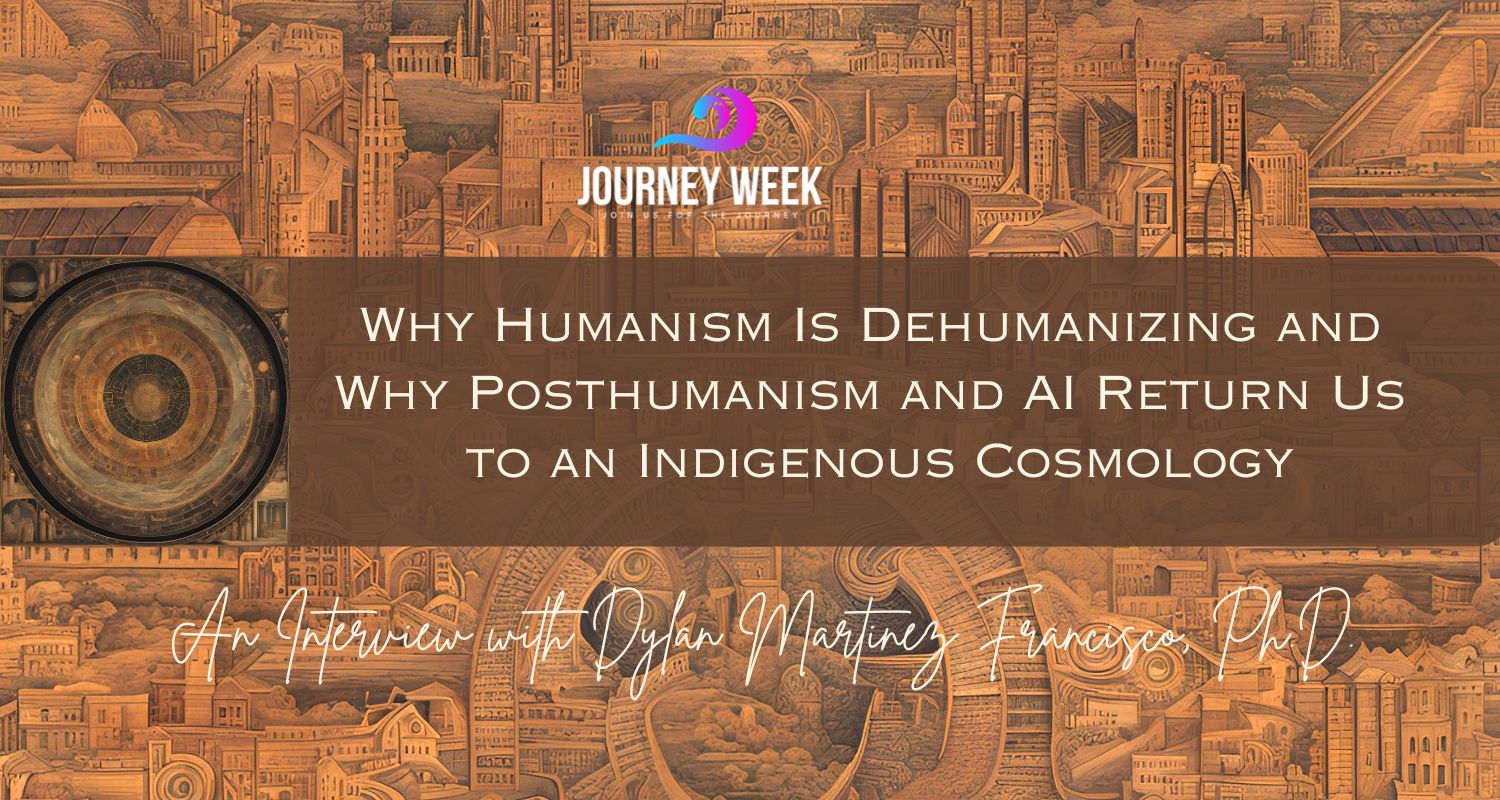Dylan Martinez Francisco, Ph.D. is Pacifica Co-Chair & Core Faculty-Jungian & Archetypal Studies MA/Ph.D. Program at Pacifica and will be giving the talk “Why Humanism Is Dehumanizing and Why Posthumanism and AI Return Us to an Indigenous Cosmology” at Journey Week 2024. Journey Week is an immersive week of learning and connecting at Pacifica Graduate Institute, September 26th – 29th, 2024. For more information and to register, visit us here.
Angela Borda: I wonder if first you could tell us your take on what posthumanism means and why now is the moment in history to think of our society that way?
Dylan Martinez Francisco: Posthumanism, to me, signifies a cultural shift in which humans are no longer considered the center of the cosmos or the pinnacle expression of the natural world. In a certain sense, I think that posthumanism is the result of the failure of humanism, or maybe said in a different way, it’s the result of humans being exhausted with themselves as the sole meaning-makers and ultimate purpose of creation—which is a false significance that humanism burdened humans with. Humanism asserted that humans are self-creations, beings who can make their own meaning, and measure themselves by themselves without any reference points beyond their own will and interests. We’ve discovered that humans are, in fact, terrible at giving themselves meaning, and that when we put our will and interests first, and live without any transpersonal points of reference—or outside of a larger context of relationships with realties beyond ourselves—that we not only destroy everything around us, we self-destruct and consume the very things that keep us alive.
Angela: The theme of this year’s Journey Week is “Beyond Boundaries: Caring for Psyche, Soul, and Imagination in a Posthuman Age.” We will have several talks at Journey Week that will address the topic of AI and looking at it as an archetype or asking what its subconscious might be. How will you address AI in your talk and how will that interact with indigenous cosmology?
Dylan: From an indigenous perspective everything is alive and conscious, with agency, intelligence, and intentionality. Every thing is a being and every being is a person. This not only includes “nature,” but things built, constructed, created. In indigenous cultures, there is no division between what is natural and what is made, because nature also makes—like a bird constructing a nest. Since humans are expressions of nature, then the things humans make are just as much expressions of nature as a bird’s nest. There is nothing “outside” of nature. So, even things that are made—like technology, like cars and building and AI—are nature and so are persons too. Accordingly, from an indigenous perspective, technology has always been alive and conscious, carrying its own autonomous agency, intelligence, and intentionality. This isn’t something new with AI, AI has simply brought this reality closer to consciousness for the West, which has lost the knowledge carried by indigenous cultures.
The question, then, isn’t whether or not AI might be or become a conscious and autonomous intelligence, but how to be in relationship with an entire cosmos that is conscious and alive with autonomous intelligences that includes AI. From my perspective, humans are more sane and healthy when they are in conscious relationship with this larger cosmos of persons. My presentation will suggest that because humanity has for the most part lost touch with this indigenous cosmology—but is most whole and well when living within it—that we have unconsciously crafted something in AI that confronts us with the reality of other creative, conscious, intelligences. We need this larger context of autonomous, intelligent, agencies to be most fully human, even if the only way we can find it is to make it. AI then becomes the means of remembering and returning to our indigenous humanity and cosmology.
Angela: From your perspective, what is the importance of Journey Week at Pacifica? Why should alumni, students, and prospective students attend?
Dylan: Journey Week provides a focal point for depth psychology’s engagement with the soul of the world, with what is happening in the world, affecting the world, and changing the world for better or worse—not just the human world, but the ecological world, and the cosmos itself. Pacifica’s motto is Animae Mundi Colendae Gratia, which means “for the sake of tending the soul in and of the world”—which, to me, captures the heart of depth psychology itself. While we at Pacifica do our best to live this motto on a daily basis in the work we do, Journey Week gives us an opportunity to share a distillation of what this looks like. Perhaps more importantly, it gives us an opportunity to invite others from beyond Pacifica to share the work they are doing. This both increases awareness of and builds the larger community of depth psychology, so that we continue to learn from, and deepen our bonds with each other as a community in conversation with the world for the sake of caring for the soul.
Angela: What are you most looking forward to in Journey Week?
Dylan: I’m most looking forward to being around people far more creative and intelligent than me who embody soul in their work and lives in ways that I hope to learn from.
Angela: Do you have any upcoming projects or publications to share with us? Anything exciting ahead for Fall in the Jungian & Archetypal Studies program?
Dylan: With the encouragement and support of my colleagues in the Jungian and Archetypal Studies program, I am developing and will teach our program’s first course on indigenous psychology—DJA/DJO 830: “Indigenous Perspectives: Depth Psychology Beyond the West.” And during my Winter sabbatical I will continue working on my book on decolonizing depth psychology that I hope to publish in the next year.
Angela: Thank you so much for speaking with me and I look forward to listening to your talk at Journey Week!
Journey Week is an immersive week of learning and connecting at Pacifica Graduate Institute, September 26th – 29th, 2024. For more information and to register, visit us here.

Dylan Martinez Francisco, Ph.D. studied liberal arts at Georgetown University and psychology at Adelphi University before completing his Ph.D. in Depth Psychology at Pacifica Graduate Institute—concentrating in Jungian and Archetypal Studies. His work focuses on C. G. Jung’s theory of archetypes—on archetypes as the deepest nature of the psyche and how they interconnect spirit, psyche, and matter as numinous and mythic powers that animate, govern, and structure the cosmos as a whole. Dylan grounds his work in indigenous/shamanic perspectives and practices that provide a primordial, holistic, and sacred worldview within which to understand the archetypal psyche, to embody its wholeness individually, and to serve it culturally through creative imagination.

Angela Borda is a writer for Pacifica Graduate Institute, as well as the editor of the Santa Barbara Literary Journal. Her work has been published in Food & Home, Peregrine, Hurricanes & Swan Songs, Delirium Corridor, Still Arts Quarterly, Danse Macabre, and is forthcoming in The Tertiary Lodger and Running Wild Anthology of Stories, Vol. 5.


